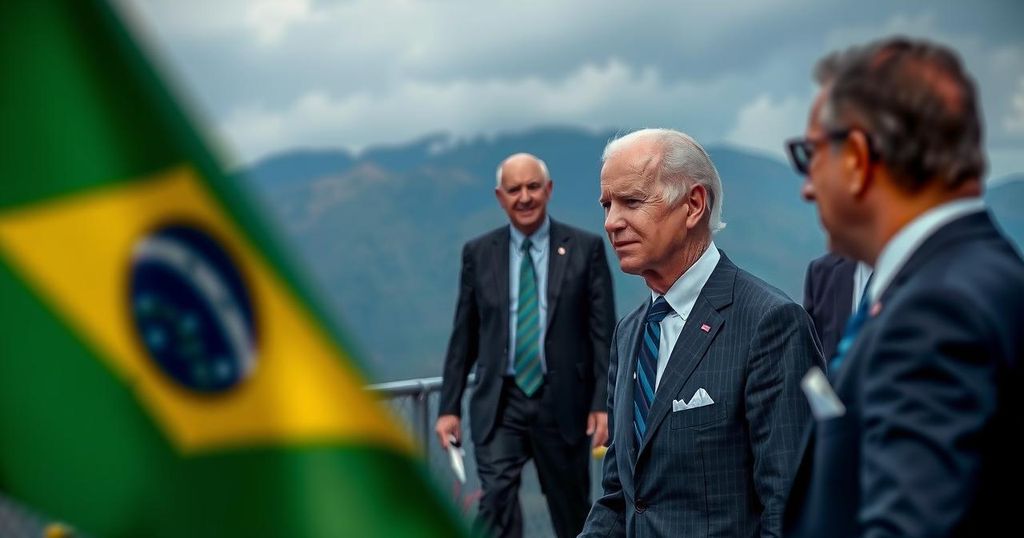Biden’s South America Trip: A Final Diplomatic Engagement Before Trump’s Presidency

President Joe Biden is set to undertake a significant journey to South America, engaging with global leaders at APEC and G20 summits during a pivotal transition in U.S. foreign policy amidst Donald Trump’s upcoming presidency. His agenda includes discussions on international cooperation, climate change, and national security, particularly in relation to China and relationships in the Indo-Pacific.
This week, President Joe Biden embarks on a significant trip to South America, potentially marking his final engagements with global leaders before President-elect Donald Trump takes office. The visit includes participation in the Asia-Pacific Economic Cooperation (APEC) summit in Lima, where he is scheduled to meet with Peru’s President Dina Boluarte and other dignitaries. Amidst a backdrop of prospective changes in U.S. foreign policy, Biden aims to solidify America’s strategic relationships in the Indo-Pacific region. National security adviser Jake Sullivan emphasized the importance of this trip in maintaining these alliances. During the summit, Biden will have his first discussion with Chinese President Xi Jinping since they last convened in November of the previous year. This conversation is expected to focus on ensuring continuity in U.S.-China relations, particularly regarding military communications. An administration official acknowledged the complexities inherent in the U.S.-China dynamic and the need for any forthcoming administration to adeptly manage these interactions going forward. Additionally, Biden’s itinerary includes a historic visit to the Amazon rainforest in Manaus, Brazil, to engage with local indigenous leaders centered around climate protection efforts. This visit symbolizes his administration’s commitment to combating climate change, which contrasts sharply with Trump’s skepticism towards environmental policies. Biden will conclude his trip at the G20 summit in Rio de Janeiro, where he aims to reassure international allies during a time of transition in U.S. leadership. Sullivan outlined that Biden’s ongoing message will emphasize the integral role of allies in ensuring national security, while also addressing pressing geopolitical issues and economic assistance for developing nations.
The article reflects on President Joe Biden’s diplomatic efforts as he travels to South America for significant summits shortly after U.S. election results indicate a change in leadership toward President-elect Donald Trump. The implications of the shift from Biden’s foreign policy to Trump’s potential tariffs and climate change stance are pivotal discussion points. Maintaining strong international relationships in the face of these impending changes is vital as Biden seeks to reassure global partners of America’s commitment to collaboration in various domains, including climate action and security.
In summary, President Joe Biden’s upcoming trip to South America represents a critical juncture in U.S. foreign policy as he seeks to reinforce alliances and discuss pressing international matters with world leaders. With the impending transition to Trump’s administration looming, Biden’s dialogues at APEC and G20 summits promise to shape the future of American diplomacy, particularly in addressing complex geopolitical relationships and climate initiatives. As he emphasizes the importance of allies, the contrast in political agendas between his administration and the incoming leadership indicates significant challenges ahead.
Original Source: abcnews.go.com







